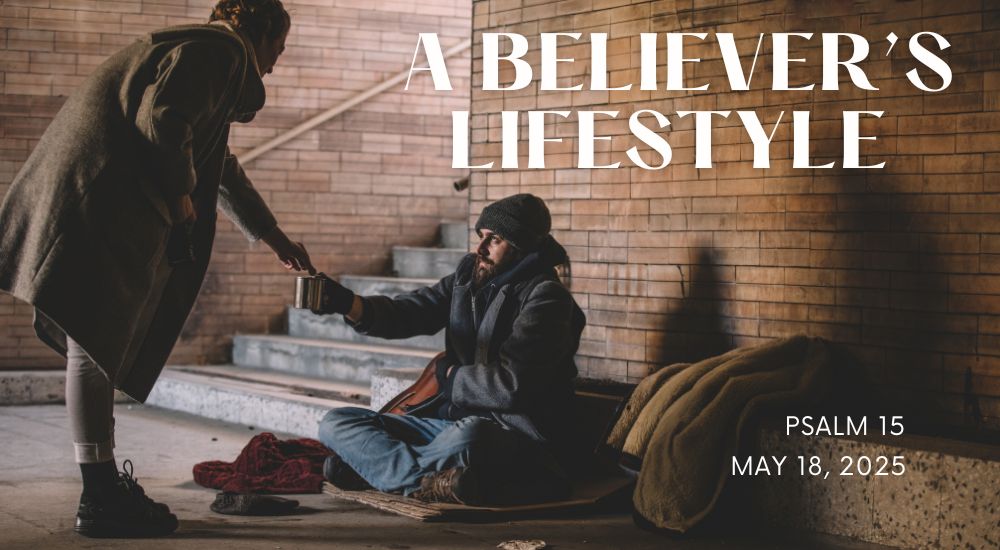
This brief but poignant psalm presents a picture of a true citizen of Zion, one who is travelling on to the city of God, where he will dwell with Him forever. The psalm may be said to be ethical rather than evangelical; it tells us what a Heavenly Citizen is like rather than the way to become a Heavenly Citizen. The psalm might well be entitled, “Practical Christianity”.
Psalm 15:5c: “He who does these things shall never be moved.”
- Grammatical Usage: “shall never be moved” or in Hebrew, “yim·mō·wṭ lō” meaning, “will not ever waver, slip, shake, fall.”
- Literal Interpretation: the one who does these things will never waver or be shaken, resulting in a slip and fall.
- Contextual/Comparison: God keeps His Word: God continually uses His Word. In 1 the psalmist asks God a two-fold question: what is the significance of and difference between “sanctuary” and “holy hill”? Is there perhaps a reference here to the Church Militant (on earth), typified by the Sanctuary/Tabernacle, and to the Church Triumphant (in Heaven)? Before we can go to Heaven we must be a member of the true Church on earth, so the psalmist asks, “Lord, who are those who belong to the true Church down here…and who are travelling on to the Heavenly City? Describe them, Lord.” And the rest of the psalm is the Lord’s description of these privileged pilgrims who are journeying Zion-wards to live forever with Him. Let us test ourselves by God’s ideal of the Christian life:
- THE HEAVENLY CITIZEN IS ONE WHOSE LIFE IS BLAMELESS
Read v. 2. The thought contained in the word “blameless” is not that of perfection but of being without blame. Look up Philippians 2:15. We shall never be sinless down here, but we are to be blameless, harmless and without rebuke, that is, irreproachable. Notice that it is our character that is to be blameless; our character is what we are in God’s sight – what we are in our heart (v. 2). We are to be blameless both in what we do (“walk”) and in what we say (“speak“). How is this possible? The reality of Philippians 2:15 is in Philippians 2:13!
- THE HEAVENLY CITIZEN IS ONE WHO IS CHARITABLE TOWARDS HIS NEIGHBOUR
Compare v. 3 with Mark 12:31. The test of our love to our neighbors has to do with our tongue and our ear – what we say about them and what we hear about them. God’s ideal man will be very slow to say and very slow to hear anything harmful about another. In Leviticus 19:16, the talebearer is likened to a peddler who goes from house to house selling his wares. How solemn to “sell” friends and fellow believers! Look up 2 Thessalonians 3:11 and 1 Timothy 5:13. Beware of being a busybody – see James 1:26. Psalm 141:3 is a good prayer to pray.
- THE HEAVENLY CITIZEN IS ONE WHO IS CAREFUL OF HIS FRIENDSHIPS
In the first part of v. 4 we have a negative and a positive description of the right kind of companions to have. We are constantly surrounded by worldly and ungodly people, but we are not to make them our bosom friends. We cannot be true to God if we court the friendship of ungodly people. “The friendship of the world is enmity with God” (James 4:4). We cannot serve two masters, God and mammon (Luke 16:13). How bad can be the influence of a bad friend; but how good can be the influence of a good friend! A great man was asked the reason for his success, and he replied, “Well – I had a friend!” So, “make friends of God’s children!
- THE HEAVENLY CITIZEN IS ONE WHOSE WORD IS HIS BOND
He always keeps his promises; he is absolutely trustworthy. Look at the last part of v. 4. This means that if we make a solemn promise and then later discover that we have promised something that is to our own disadvantage, we will keep our word, and rather than break our promise we will be the losers. God will always honor us in such a case (1 Samuel 2:30; Matthew 6:33). This is certainly not the world’s way of doing things, but it is God’s way, and therefore it must be our way. It is very sad when a Christian breaks his word and cannot be trusted.
- THE HEAVENLY CITIZEN IS ONE WHO IS MERCIFUL IN HIS DEALINGSv.5 tells us this. God has no place for the Christian employer who is very generous with his gifts to the church but keeps his employees working long hours for low wages. God’s people should never make unjust gains, especially at someone else’s expense.
- THE HEAVENLY CITIZEN IS ONE WHO HAS AN UNSHAKEABLE HOLY LIFESTYLE
v.5 ends with the affirmation that faithfulness results in an unshakeable lifestyle. Living in a pagan society comes with great pressure to conform, but:
-
- Holiness requires we fix our hope our Christ alone (1 Peter 1:13)
- Holiness requires taking every thought captive to the obedience of Christ (2 Cor. 10:5; Romans 12:2)
- Holiness requires spiritual alertness (1 Peter 5:8)
- Holiness requires a break with our past lifestyle (1 Peter 1:14)
- Holiness requires we establish a pattern of obedience (Leviticus 19:12; 1 Peter 1:14)
- Holiness requires we, “fix our eyes on Jesus, the author and perfecter of our faith” and keep running our race (Hebrews 12:2)
- Holiness requires we never lose sight of Christ’s return (Acts 1:11)
- Conclusion: Is my lifestyle reflecting what I am and what I know in Christ?
